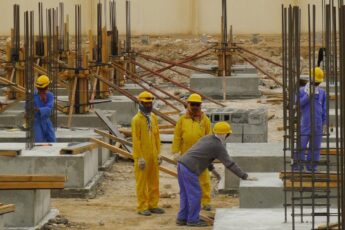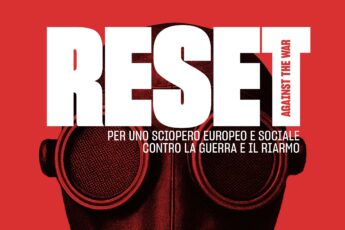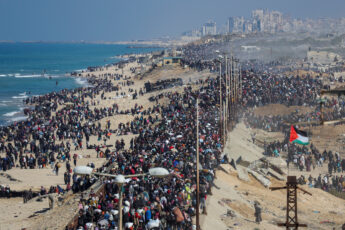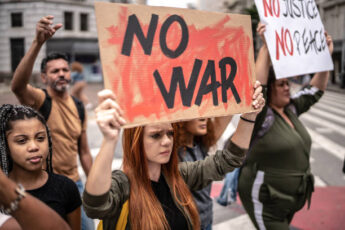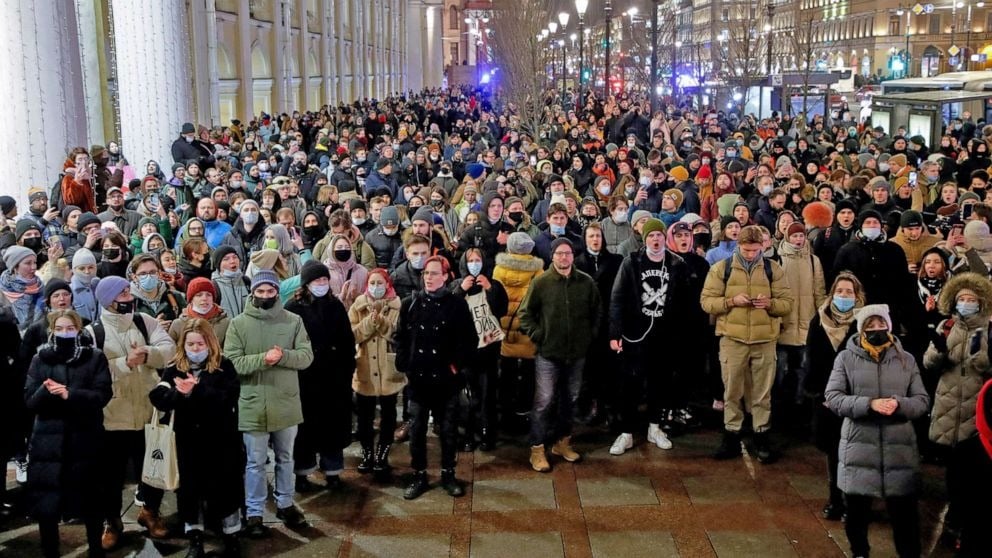
The following text was presented by the TSS Platform at the first TSS No to War Assembly on March 20th. An outcome of this event is the creation of a Permanent Assembly Against the War, an open political space for all those who want to oppose this deadly present: read more about the Permanent Assembly here.
As the war broke out, we issued a statement called “No to war. For a Transnational Politics of Peace”. The statement had a lot of resonance and signatures. So, we decided to call for this assembly, because now it is urgent and necessary to come together, from different places, those who are hit directly by the invasion, those who are opposing this war in Russia, those who are fleeing, those who will be affected by the consequences of this war elsewhere, not only in Europe but worldwide, those who are struggling not to be oppressed and exploited. This is no task that a single collective can manage.
As TSS in the last years, we have worked to push forward transnational initiatives and connections. We have insisted that a priority was to bridge the gap between Western Europe and the Central and Eastern European region, beyond the borders of the EU, because we recognized that the region is and was crucial for any social and workers’ struggle. We supported the creation of the important network E.A.S.T. (Essential Autonomous Struggles Transnational), centered on feminist struggles around social reproduction; and of the Transnational Migrants Coordination, a coordination between migrant collectives around Europe, in Turkey and Northern Africa fighting against the border regime and institutional racism.
Today it is clearer than ever that it is time to unite and come together transnationally against this war. There are many grassroots initiatives of solidarity and support, we need to coordinate more and to exchange reliable information on what is needed. But we need something more than this: we need a transnational movement against the “new normality” that is building up through this war, a new normality that seems to close any possibility to struggle if one does not align on the fronts of the war. A general attempt to redraw global relations is in place. This assembly wants to be the beginning of something permanent, an open process to unite all those who oppose this new warlike normality.
This war has highlighted how fragmented the autonomous voice of workers, migrants, women, and men who are fighting against exploitation and oppression is. In the blink of an eye as soon as war broke out, all there were, were national fronts. Until a very short time ago we were fighting against the EU letting migrants die at the border between Belarus and Poland, making the lives of migrants impossible, putting Ukrainians at the bottom of the labor market with the lowest wages and the nastiest jobs, and we’ve found ourselves in front of a deluge of patriarchal benevolence to welcome Ukrainian women and children. We were trying to build an opposition to the reconstruction plans after the pandemic, we were pointing out how the EU has been complicit in keeping its Eastern peripheries in a condition of poverty, what we see now is an EU presented as the champion of democratic nationalism against the brutal authoritarianism of Putin. We were fighting against male violence over women, against the reactionary anti-gender politics in Eastern Europe and Turkey and now what we are seeing is the patriarchal picture of weak and dependent women in need of help and brave men fighting.
In this turn of events, our main aim is to refuse the language of war and create communication across the fronts of the war. This is also why we are opening this assembly with an intervention from comrades in Ukraine and one from the feminist anti-war resistance in Russia. This crossing of fronts should be the priority of what we call a transnational politics of peace. We are not interested in mimicking foreign ministers or generals or diplomats as to what should be done to end the war, what should the people in Ukraine do, we are not here to judge choices and pretend to know better or speak for someone else. We are here to build something together.
The statement we issued has received the accusation of neutrality because we haven’t been vocal enough in condemning Putin’s aggression. We agree that it is not enough to say we are neither with Putin nor with the US or NATO. We agree that the condemnation of Putin’s aggression should be unconditional. What has been taken for neutrality, though, is an open and likewise unconditional aligning on the part of those workers, migrants, women and men that are suffering from this war, that are fighting against the tragedy that this war means for the possibility they have to make choices on their future, to have a future. It is not neutrality, but an aware choice to cross the fronts of war, to say that people in Russia are not all siding with Putin and many of them will suffer from economic sanctions, poverty and oppression. It is a choice to recognize a patriarchal mark that crisscrosses the fronts of war: we refuse the symbolic picture of the patriarchal peace between Ukrainian women and Ukrainian men that the logic of war is representing.
Peace is not an abstract ideal, it is not social peace, a condition where all conflicts are finally over. A politics of peace in our view says that we need to break the spell that war creates to make all conflicts blocked and freeze. We want peace because we don’t want women and men to have to die because they have to obey, or because they have to flee or because they want to live. We need peace because we need to resume fighting against those we are daily confronted against in the workplaces, in the houses, in society. We want peace not as an international agreement between States, but as a politics where we can start again to decide about our futures.
The meaning of a transnational politics of peace should be built together collectively starting from this assembly and in the months to come. And our politics of peace should be transnational. This war has consequences and causes that go well beyond Ukraine itself. We are not here as representatives of our country or of our organization, we are activists, workers, many of us have experiences of migration, as women and lgbtqi+ people we are confronted with a patriarchal violence that has no passport. The economic consequences of this war cross the borders of Ukraine – finance, climate emergency, energy policies, money spent for armaments: all these are long-lasting effects of the war in the years to come. Capital is striving to make profits from this war. We need to be able to address these entanglements to write our own plan for a transnational politics of peace.
This task goes beyond transnational solidarity. Many of us have taken part in demonstrations all around, we have participated in the demonstrations on March 8th saying “strike the war” across Europe and beyond, there is practical support, plans for workers convoys will be presented and the comrades from Ukraine will explain to us how the situation there is. While supporting and taking part in these initiatives, we think that something different is needed. We want to take steps to advance a program of what is really important for us, how money should be spent, how we can transform the impossibility to choose into a struggle for the power to choose over one’s lives. We need to turn this impossibility to choose a side into connections for being free not to die, not to flee, not to be exploited. We need to build this together and this is the opportunity we have to do it. A transnational politics of peace is not a position on what others are doing or should be doing, peace is not an agreement between States, the goal is to build a difficult complicated autonomous position in this warmongering and deadly present. We need an alternative plan to oppose this politics of war and violence in the interest of state and capital, a transnational politics of peace on the side of workers, migrants, women and men. And this is what we want to discuss with you with this assembly.


